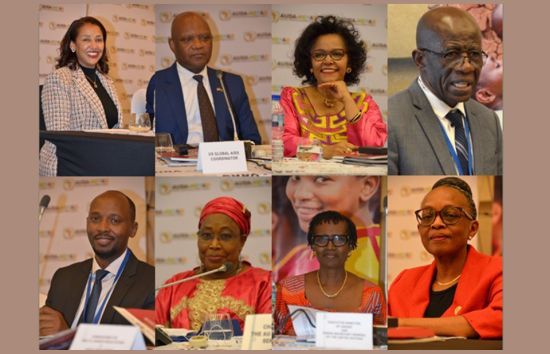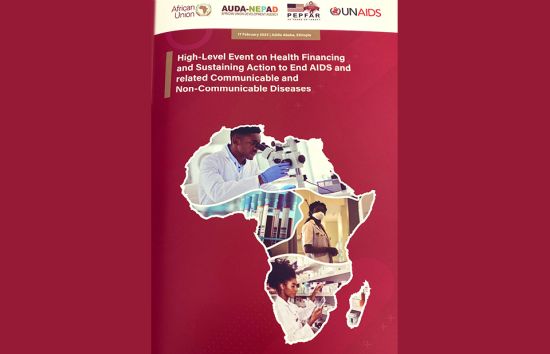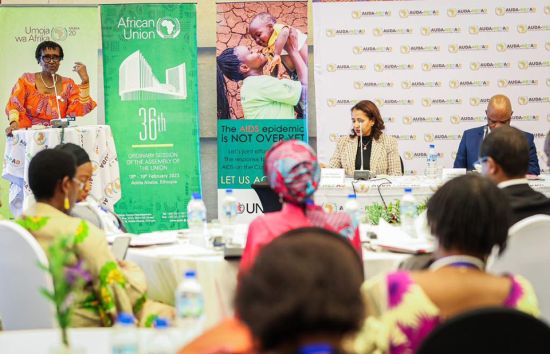|
PRESS RELEASE
African leaders pledge new commitments to end AIDS
ADDIS ABABA, 20 February 2023—African leaders and partners have joined together at a high-level event on the side-lines of the 36th Session of the African Union to commit to a set of actions to boost progress towards ending AIDS. The event, Health Financing and Sustaining Action to End AIDS and Related Communicable and Non-Communicable Diseases, was co-hosted by the African Union, NEPAD, UNAIDS and PEPFAR.
During the event, heads of state and government adopted a declaration which includes commitments to take personal responsibility and provide active leadership in the AIDS response, champion science and mobilize domestic political and financial support.
The United States is the Global Fund’s largest donor and has pledged $6 billion for the organization’s 7th replenishment contingent on the $18 billion target being fully met. Last week, Japan announced that it was increasing its contribution to the Global Fund by 30% to more than $1 billion.

African Union Development Agency – (AUDA-NEPAD) Chief Executive Officer Nardos Bekele-Thomas gave the opening remarks, stating that this was the right time to reflect on previous commitments, implementations, and what has worked and what has not. “The COVID-19 pandemic presented essential lessons that we should use to shape the future of our health systems, the African Continent spearheaded collective actions to respond better. Furthermore, we saw the private sector coming together to work with the Governments to provide services to the people that needed them.”
The commitments come at a critical time because despite unprecedented progress, AIDS in Africa is far from over. The massive impacts of the twin pandemics of COVID-19 and HIV have exposed huge weaknesses in health systems across Africa and the continent is not on track to achieve an AIDS-free Africa by 2030.
“The coming into force of the African Medicines Agency (AMA) Treaty is an important milestone for the Continent. Aligned and coordinated regulatory systems will open up the continental market for pharmaceuticals and enable our manufacturers to leverage the advantages of the ACFTA. The AUDA-NEPAD will continue taking technical leadership in the operationalisation of the AMA which will bring us a step closer in our fight against AIDS” said Nardos Bekele-Thomas.
Africa has been disproportionately affected by the AIDS pandemic with 67% of people living with HIV living on the African continent. The spread of the disease has affected every dimension of African society.

"This event is timely as it will allow us to take stock of the progress made and challenges remaining and to consider a way to end AIDS by 2030," stated H.E. Amb. Minata Samate Cessouma, Commissioner for Health, Humanitarian Affairs and Social Development, African Union Commission. "A roadmap that will include achieving the 95-95-95 targets, access to medicines and diagnostics, reducing new infections, diversified and sustainable financing, while closing the equity gap. Let me reaffirm that whenever our leaders take bold initiatives and actions, significant progress has always been made. I hope there will be an Extraordinary Summit dedicated to taking concrete steps towards an AIDS-free Africa by 2030," she concluded.
United in efforts to end AIDS, Africa, supported by partners including UNAIDS, PEPFAR and the Global Fund to Fight AIDS, TB and Malaria, has achieved remarkable results. New HIV infections have been reduced by 60% since the peak in 1996 and in some countries by as much as 95%, AIDS-related deaths have been reduced by 72% since the peak in 2004, and in 2021, 88% of people living with HIV in Africa knew their HIV status of whom 89% were accessing antiretroviral treatment.
However, for the first time in more than two decades, global progress against AIDS is faltering. In Africa, six out of seven new HIV infections among adolescents aged 15-19 years were among girls. Women and girls accounted 62% of all new HIV infections in 2021 and only 50% of children living with HIV received the lifesaving treatment they need.
During the event leaders committed to create a conducive structural, legal, regulatory, and policy environment that addresses persistent HIV-related equity gaps, promote gender equality, respect human rights, and eliminate discrimination and stigma against people living with HIV.
U.S. Global AIDS Coordinator and Special Representative for Global Health Diplomacy Ambassador Dr John Nkengasong, who oversees PEPFAR said, “When HIV/AIDS is over, establishing regional manufacturing on the Continent of Africa will be our legacy for fighting infectious disease across the Continent and globally.”

The declaration noted that weak health systems are continuing to hamper progress, including inadequate human resources for health, weak drug and commodity supply chains, insufficient quality control, inadequate integration of HIV services with other health and social services. A failure to build the capacity, fund and include community organizations as critical and valued partners in the response to HIV is also preventing accelerated progress.
Winnie Byanyima, UNAIDS Executive Director sees universal health care as key. “Universal Health Coverage is another opportunity for African self-reliance, creating national insurance schemes where resources are collected and insurance is rolled out for all those who cannot afford it,” she said. “This must include HIV services. People living with HIV are citizens like any other.”
There was also a deep concern that a significant share of HIV-related programmes were primarily managed, implemented, and financed by external donors rather than governments, and that less than 10% of the 55 African Union member states have met their pledge under the Abuja declaration to allocate 15% of the annual budget to the improvement of the health sector. In the new declaration, leaders committed to implement the Abuja 15% target on domestic financing for health, while transitioning away from dependence on partners’ funding.
Leaders noted with appreciation the Outline of the Roadmap to 2030: ‘sustaining the AIDS response, strengthening health systems and ensuring health security’; and its six pillars and requested the Commission, AUDA-NEPAD to develop a fully costed Roadmap to 2030 and to submit to the Assembly at its next session.
It also invited the Assembly, 10 years after the Abuja+12 to hold a Special Session on Ending AIDS, preventable Maternal deaths and Health Systems strengthening by 2030 no later than July 2024; and called on partners, especially PEPFAR, UNAIDS, The Global Fund, The African Private Sector and others, to support the implementation of this Declaration and Roadmap to 2030.
MEDIA CONTACT:
UNAIDS | Charlotte Sector | sectorc@unaids.org
AUDA -NEPAD | Buhle Hlatshwayo | buhleh@nepad.org
African Union | Whitney Mwangi | WhitneyM@africa-union.org
PEPFAR | Veronica Davison | davisonv@state.gov
Source: UNAIDS
"Reproduced with permission - UNAIDS"
UNAIDS
For more HIV and AIDS News visit...
Positively Positive - Living with HIV/AIDS:
HIV/AIDS News
|